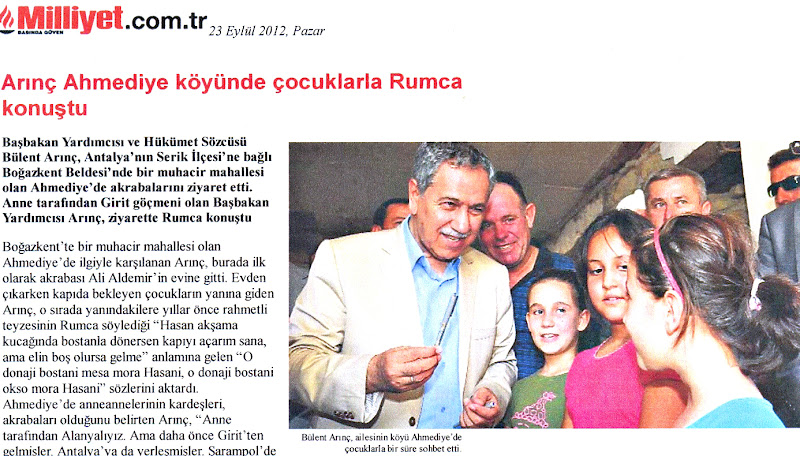
The
Turkish journalists who
accompanied
Bülent Arinç,
vice President of the Turkish
government and close associate of
Prime
Minister
Erdogan, were greatly surprised when he visited his
home town in the region of Attaleia and began to speak in Romaic
- that is, Greek - with his relatives, but also with the village
children who ran to meet him.
Specifically,
according to the Turkish reports (newspapers Hurriet and
Milliyet dated 23/9/2012), the Vice President of the Turkish
government, Bülent Arinç,
recently visited his paternal home town of
Boğazkent in the
region of Attaleia.
In his village
there is an entire suburb with the name Ahmediye. It is where
Arinç's parents - and now his relatives - reside, who are
Greek-speaking Cretans, as are the remaining inhabitants of the
region. Upon arriving at the home of his relative, Ali Aldemir,
he began to publicly converse with him in fluent Romaic - that
is, Greek - which astounded the Turkish reporters. He then
approached his elderly aunt, with whom he also exchanged a few
words in Romaic - naturally without his escorts understanding
any of it.
Arinç remembered
his childhood years, when - as he characteristically mentioned -
his parents and his relatives would shout out to him as they
rose in the morning to go to the fields: "Come out, Hasani!
Come in Hasani!" - typically Greek expressions which had
remained in his memory from his childhood.
Then, after
greeting the village children and speaking to them in their
native language - as the children also spoke the same,
Romaic tongue - he explained to the amazed Turkish reporters
that his parents had come to that region of Attaleia from the
island of Crete, during the time of the sultan Abdulhamid. "My
parents",
Arinç stated, "are of Cretan
origin, which is why they don't know any Turkish at all, and at
home, they spoke only Greek." He also informed them that
other relatives of his - also Greek-speaking Cretans - had
settled in the region of Samframpoli and the neighbouring region
of Alaneia.
It is a known fact from historical
studies also, that the overwhelming majority of the so-called "Turco-Cretans"
were islamized Romanics. That is the reason they were not in the
least familiar with the Turkish language, while their religious
awareness was very lax, often confusing Orthodoxy with Islam.
Characteristically, the well-known Ottoman Turkish
traveller Evliya Çelebi in one of his books that refers to
Crete, mentions "the existence of 7000 bourmas (islamized
Romaics), who accepted the religion of Islam en masse; of others
who rejected it and fled to the mountains of Sfakia and
remained subjugated, and of several thousand panicked Greek
soldiers, who gave themselves up to the enemy and also acceded
to its religion."
Also according to
the British botanist, Aubyn Trevor-Battye, "The Turks of Crete –
by not being actual Turks but Christian apostates - are not
interested in the Prophet. The real Turks - the ones who
comprised the army that took over the island - departed, while
those who remained and called themselves Turks are in fact
Cretans in appearance and besides, they speak the Cretan
language. Very few of the Turco-Cretans that I had
encountered knew enough Turkish, while many - perhaps most of
them - did not obey the Koran, as they drank wine freely."
Generally speaking,
many well-known Greek authors have written about the so-called
Turco-Cretans, but also about the crypto-Christians of Crete,
while the saga of the Kormoulis family is also very familiar -
that large Turco-Cretan family who with the first opportunity
revealed that they were crypto-Christians and returned to their
paternal faith, and who also fought against the Ottoman army
during the Hellenic Revolution of 1821. One is also
impressed by the fact that, despite the many years after the
time that the so-called Turco-Cretans left Crete, they still
continue to speak the Greek Cretan dialect, that their
descendants have not forsaken Crete, and that they feel
themselves to be more Cretan than anything else.
(*) Turkology
(Turkish: Türkoloji), also Turcology or Turkologie, is a complex
of humanities sciences studying languages, history, literature,
folklore, culture, and ethnology of people speaking Turkic
languages and Turkic peoples in chronological and comparative
context. This includes ethnic groups from the Turks (Turkish
People), Sakha in East Siberia to the Balkan Turks and Gagauz in
Moldova.
Translation: K.N.